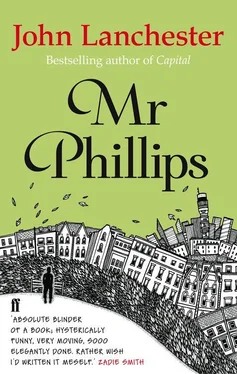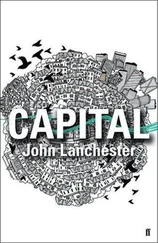Mr Phillips can feel everybody on the upper deck of the bus willing the man not to sit next to them. As if conscious of his moment in the invisible spotlight, the tramp stands at the top of the stairs and slowly scans the upper deck of the bus. Mr Phillips concentrates on avoiding eye contact while looking bored and unprovokable. The new arrival takes two steps towards the back of the bus and then with odd gracefulness swings around and heads for the front, tacking from side to side of the narrow corridor as he goes. With terrible inevitability he sways to the very front of the bus and sits down, with a loud combined sigh and cough, next to the girl in school uniform.
It isn’t often, Mr Phillips thinks, that you see tramps on buses. Presumably it’s the expense. On the Tube you see them all the time, especially on the Circle Line, where they got a whole day riding around and around for the price of one ticket, being spun around the capital like the flags on a prayer wheel. Mad people you saw all the time too on the Underground. In fact, after a certain time of night the Tube seemed to be populated entirely by the mad, the drunk, and the frightened.
Mr Phillips wonders what it would be like to become a tramp. If he didn’t go home this evening, for instance, but simply rode the Underground until it closed, watching the ebb and flow of human types through the long day — the people travelling to work in the morning, the afternoon-shifters, the tourists with backpacks and maps and guidebooks and questions, the errand-doers, the unclassifiables on trips of all stripes, the students, hookers, nurses, actors, all those who work funny hours, then at the end of the afternoon people returning from work, hanging from straps and clinging to poles in their tight hordes, heading out from the middle of town like an orderly crowd fleeing a disaster, Mr Phillips comfortably ensconced in the corner seat he has bagged during the mid-morning pre-lunch lull, in between dozes and daydreams and periods when his attention goes offline like the Wilkins and Co. IBM mainframe. Then the reverse exodus for the evening’s diversions, plays and movies and pubs and clubs, and then the late-night hour of the knackered and the smashed, which leads into the slow extinction of the network, the dwindling frequencies of the trains until shutdown at one or so, when he would go to one of the big railway terminals — probably not Euston or King’s Cross (too many Scotsmen, drug dealers, tarts, pimps, all that). Victoria, say, where he would try and find a spot to sleep or at least sit for the night. Later on in his career he would be more knowledgeable about soup kitchens, night shelters. He would learn the ropes.
The next day, after his first night on the skids, he would be more bedraggled, poorer — obviously there would be no getting money out of the bank without letting on where he was. And then in the days to come he would be integrated more and more completely into this new life. Becoming dog-tired on a brief excursion outside the Underground he would sit down beside a wall at the side of a pedestrian underpass, taking the weight off, and as he sat a passer-by would drop a coin in his lap, and he has become a beggar, a mendicant. Over the next days and weeks he develops his tramp routines, his pitches and places to sit; he becomes invisible, so that even if someone who knows him were to walk past — Mr Wilkins or Mr Davis-Gribben his neighbour or even Mrs Phillips — he would not be recognized. The point would be to hide in plain sight, simply to melt into the city like a raindrop in a puddle. It would be a version of what men in India did, making their pile and providing for their families before going off to be a sanyassin , a holy man, free of earthly connections; free of family. To live without love, that would be the idea.
The tramp at the front of the bus seems to be attempting to start a conversation with the schoolgirl. At least he is making noises in her direction while she looks out of the window trying to ignore him, the poor thing. It’s such a feature of city life, being bearded by madmen and weirdoes. When Thomas played in the all-conquering St Winifred’s Under-11 football team their matches attracted a regular spectator who wore a green duffle coat and a matching felt hat decorated with three prominent feathers. These were different each week, and looked as if they had been freshly plucked. The man was always either beaming as if he had just won the Pools or scowling like a mad vicar about to launch into a sermon denouncing everything he saw. No one knew who he was. When Eric Harris, father of Wayne, the team’s little right-footed left back, approached him he would only say, ‘There’s not much I can admit to. I’m scouting for one of the big clubs, the very big clubs.’
‘Nutter’ was Eric’s summing up.
‘But is he dangerous?’ asked Mr Slocombe, whose son Grant wore glasses and was the team’s controversial goalkeeper — a good shot-stopper but weak on crosses.
Mr Harris thought about that while the two teams ran around the field being shouted at by their fathers.
‘Nah.’
This verdict proved true. The man had come to every match for a whole season and was then never seen again. By the end of that time Mr Phillips came to feel that, compared to many of the fathers, screaming orders at their boys to make ever greater and more violent effort, the poor madman’s presence was oddly soothing.
The schoolgirl in the front seat seems to be reaching a similar verdict about the tramp sitting next to her. He has said something to her that made her laugh, and she is now chatting to him, apparently happily. In fact she is smiling and giggling as he speaks. It is easy to see that if you were a funny tramp, that would give you an advantage over other tramps, Mr Phillips could recognize that. Humour is a help in almost any walk of life.
Mr Phillips has been on board the bus for about half an hour. In that time they have travelled roughly a thousand yards. His body feels as if it is secreting packets of heat about itself; when he shifts in his seat a moist, intimate gust of ball-sweat wafts up to his nostrils. But after having been completely immobile for several minutes, the bus finally squeezes over into the right-hand lane and chugs past the obstacle that has been blocking traffic. This is a huge hole in the ground, surrounded by plastic sheeting, out of which water is boiling on to the surface of the road. A group of workmen stands around the hole in bright orange safety vests and helmets. Burst water main? It is probably something to do with those miles and miles of stinking, crumbling, brick-lined Victorian sewers, each awash with everything from sink slops to rainfall run-off to plastic bags, tampons, pet frogs, coagulating kitchen fat, all the stuff people flush and wash away, not of course forgetting every imaginable variety of urine and excrement. The mad Religious Education teacher at school, Mr Erith, whose pupils would often sit listening half aghast and half trying not to giggle as he ranted on about his favourite subject, sin (he was the only teacher in the history of teaching for whom the word sin was a sure-fire, guaranteed successful red herring, leading to a forty-minute speech on the subject) — Mr Erith had liked to quote to his blushing and sniggering charges St Augustine’s words that we are born inter urinam et faeces.
‘Don’t be deceived into thinking that these are technical terms,’ Mr Erith had added, his height and width and not-quite-clerical black suit adding to both the comedy and the menace he always projected. There were rumours of the usual lurid schoolboy sort around Mr Erith, and they all contained this combination of the ridiculous and the sinister. He had been an Army chaplain who was kicked out after going on the rampage and killing an enormous number of Germans, rending them limb from limb with his bare hands. (Mr Phillips had done the sums and this didn’t quite work — Mr Erith, in his mid thirties during the late fifties, would have had to have been one of the British Army’s rare teenage padres.) He had been an Olympic level discus thrower who gave up athletics for God before being given up by God in his turn and leaving the seminary to become a teacher. He had been kicked out of priest’s school for holding seances. He had been kicked out for beating up another seminarian, after an argument about theology and/or women. He had been kicked out for beating up the college principal, who had rigged the exams so that he failed because the principal had worked out that he was having an affair with his wife. Those were the sorts of rumour.
Читать дальше




![Unknown - [Carly Phillips] The Bachelor (The Chandler Brothe(Bookos.org) (1)](/books/174132/unknown-carly-phillips-the-bachelor-the-chandle-thumb.webp)







